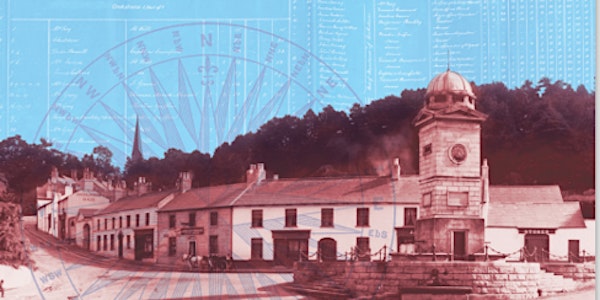
Outside the Demesne Walls: Estate Villages and Towns
22nd Annual Historic Houses International Conference at Maynooth University
Date and time
Location
Maynooth University
Renehan Hall South Campus, Maynooth University Maynooth IrelandRefund Policy
Agenda
Programme Information
About this event
- 1 day 4 hours
The country house was one component in a complex landscape that also included estate villages and towns populated by staff, tenants rural and urban, and local traders, all of whose lives and livelihoods were closely interlinked with the big house and its residents.
Many towns and villages were built on the strength of local landlord investment. Landlords might modify, demolish or, in some cases, entirely relocate a village as part of their grand architectural schemes. Their motives might be aesthetic, philanthropic or a mixture of both; but since their income depended so often upon rent rolls, the relationship with the neighbouring community was also an economic one, shaping patterns of employment, agriculture, trade, and prosperity.
Neighbourhoods – both rural and urban – would be badged with a particular family identity often manifested in its vernacular architecture or name; streets memorialised prominent local families; and squares hosted monuments to those who had died in imperial battles or were benefactors of the less well-to-do.
Landlord investment might result in better housing, sanitation and public health; the social, political and spiritual lives of tenants and neighbours might be shaped by churches, schools, meeting rooms, societies and charities, as well as essentials of infrastructure such as roads and railways, which would increasingly link rural localities with the wider world. Public houses might become social hubs as well as meeting places of the disaffected.
How important was the big house and its resident family and staff to the economy of the local village or town? Was the estate village merely an appendage to the house or was there an essential umbilical link? Why did landed families engage in such place-making? How were these interventions received by those beyond the demesne walls? Did they reinforce or remove boundaries? Were social relationships governed by goodwill, gratitude, suspicion or other sentiments? For estates that still retain large property portfolios what is their meaning and purpose today?
Did the relationship between country house and town or village differ in Ireland, the UK and further afield? For example what impact did the dispersal of great estates have on local economies in Ireland after the 1903 Land Act, in Britain after the First World War, or in Europe in the aftermath of revolution?
Outside the Demesne Walls will examine these and many other themes relating to country houses and their local town/village communities whether from historical or from contemporary perspectives.
Day 1 Monday 13 May
8.45-9.15 Registration (tea/coffee)
9.15-9.30 Welcome and opening
9.30-10.20 Plenary I
Arnold Horner Maynooth and the FitzGeralds
10.20-11.40 Session 1
Jonathan Cherry Landlords and tenants as urban developers in 19th-century provincial
Ireland: the creation of Farnham Street, Co Cavan
Jonathan Wright Village and demesne in the age of revolution: the case of Saintfield, Co Down
Ronan Foley and Suzanne Pegley The geographical reach of the big house: a case-study
of Castletown, Co Kildare
11.40-12.00 Tea/coffee
12.00-13.10 Session 2
Jean Young The unexecuted development plans for the town of Dunleer, Co Louth, drawn up
in 1842 for RM Bellew
Jeremy Hill The 1946 model village project at Monksgrange, Co Wexford
Patrick Duffy ‘Taming the West’: Westport’s landscape legacy, Co Mayo
13.10-14.00 Lunch
14.00-15.10 Session 3
Alex Ioannou Recalling change: exploring the dissonance in a community and landscape once
shaped by the Penrhyn estate, North Wales
Adam Coward A multinational landed elite in a small Welsh town: the Londonderrys
in Machynlleth, Powys, 1850-1921
Megan Dennis The ‘tender heart’ of Blickling estate, Norfolk: assessing the physical and social
impacts of a century of female estate ownership
15.10-16.20 Session 4
Anne Casement Michael Ward of Castle Ward, Co Down: entrepreneur extraordinaire?
Clair McDonald The town as cordon sanitaire: Stradbally, Co Laois, in the eighteenth century
Daniel Eglington Carey Howth village and Howth Castle, Co Dublin
16.20-16.30 Stretch the legs
16.30-17.15 Session 5
Panel and Round Table Discussion Estates and place-making: yesterday, today and tomorrow
18.45 Dinner
Day 2 Tuesday 14 May
09.00-09.50 Plenary II
Annie Tindley Inside/outside the demesne walls – boundaries, power and challenge
c.1700-the present
09.50-11.00 Session 1
David Hicks Ardagh, Co Longford: a model village
Emma Lyons Naas Town and the Morristown Lattin Estate, Co Kildare, in the eighteenth century
Suzanne Pegley Leixlip, Co Kildare, tourist destination
11.00-11.20 Tea/coffee
11.20-12.50 Session 2
Madeline O’Neill Far beyond the demesne walls: the peregrinations of an Irish butler
Daniel Watkins Alnwick Castle and town, Northumberland
Samantha Wyndham The Thomond-Wyndham estate in Co Clare
Liam Heaphy The development of the Shanrahan parish in South Tipperary after the
Land Commission
12.50 Closing remarks
Registration
TO REGISTER ONLINE (WHERE PAYMENT CAN BE MADE BY CREDIT OR DEBIT CARD) PLEASE GO TO Eventbrite
Booking options
Live two-day conference fee €60 per person
Live two-day conference fee and conference dinner €120 per person
Live two-day student conference fee €30 per person
PLEASE NOTE: Parking permits are not required for the duration of the conference. Attendees may park on South Campus, outside of the designated pay parking areas without charge.
Booking Information
Places will be filled on a first-come, first-served basis for the conference and dinner. Payment of conference registration fee and/or conference dinner fee must be received to guarantee a booking. Receipt of payment will be acknowledged by e-mail unless otherwise requested. Refunds for cancelled bookings will not be made.
Please note ticket sales close on 30 April 2024
Enquiries: e-mail cshihe@mu.ie
Twitter @historicirishho
Instagram @historicirishhouses
Tickets
Live two day conference fee
0€60.00Live two-day conference fee and conference dinner
0€120.00Live two day conference student fee
0€30.00